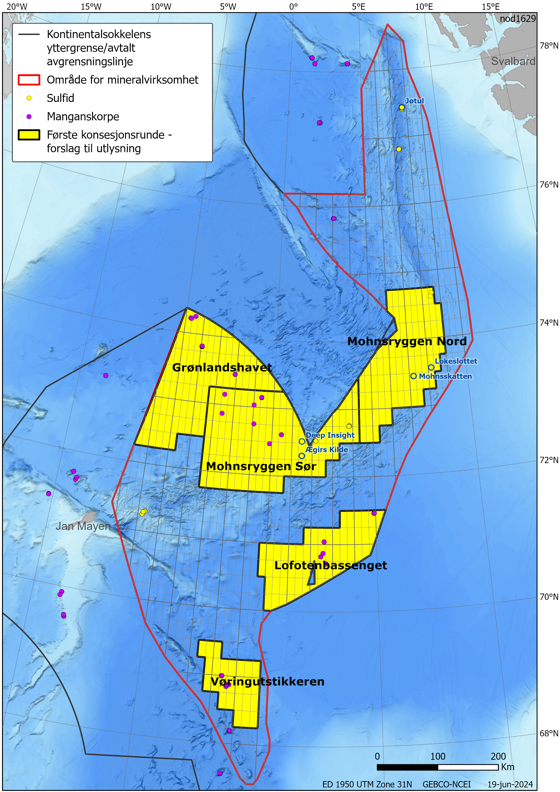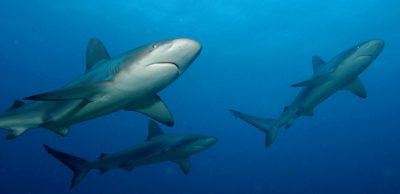Norway’s Ministry of Energy has presented a proposal for the announcement of the first licensing round for deep sea mining of seabed minerals on the Norwegian continental shelf for public consultation. The proposal sets out the areas where the companies will be able to apply for exploitation licenses, so that exploration and gathering knowledge about whether there is a basis for sustainable mineral exploitation on the Norwegian shelf can begin.
Deep sea mining is expected to cause irrevocable damage to sea life, deep below the surface.
Despite green groups suggesting the great harm deep sea mining can do to yet explored underwater ecosystems, Norway plans to go ahead, championing a need to do it for the environment, they say.
The country states:
“The world needs minerals for the green transition, and the government wants to explore if it is possible to extract seabed minerals in a sustainable manner from the Norwegian continental shelf. A large majority of the Norwegian Parliament supports the government’s step-by-step approach to the management of seabed minerals.
“This announcement is an important next step in the management of our seabed mineral resources. Environmental considerations are taken into account in all stages of the activities. Today, we are presenting our proposal for areas to be announced in the first licensing round for seabed minerals for public consultation. We plan to award licenses in the first half of 2025’,” said Minister of Energy Terje Aasland.
A large majority in the Norwegian Parliament endorsed the government’s proposal to open an area on the Norwegian continental shelf for seabed mineral activities and the main lines of the management strategy. On the basis of this, the King in Council decided to formally open an area in the Norwegian Sea and the Greenland Sea for mineral activities on April 12 this year.
“Access to minerals is crucial to ensure that the world succeeds with the transition to a low-emission society. Minerals from the Norwegian seabed can become a source to meet parts of this demand. Norway’s long experience with responsible and sustainable management of ocean-based resources, makes us well positioned to take the lead and manage these resources in a responsible and sustainable manner,” said Aasland.
The areas open to licensing from Norway are shown below.

The public consultation the Norway Government says is a part of the first licensing round for mineral activity on the Norwegian Continental Shelf. Following the consultation, the Ministry will go through the consultation responses. After this, the first licensing round will be announced.
The announcement will, among other things, include a deadline for the companies, and information about requirements and conditions that will be put on applicants related to, among other things, the environment. As part of their application, the companies will be requested to include a proposal for a work program for the area to which they are applying.
Received applications will be processed in accordance with published and known award criteria. The Ministry aims to award licenses during the first half of 2025. Licensees under an exploitation license must prepare a detailed work program tailored to the area covered by the license and the resources that are assumed to be there. Such activity is assumed to have minimal environmental impacts but will contribute to important knowledge and competence building.
The work program will normally have submission of a plan for exploitation or relinquishment of the area as the final milestone.
Licensees will also be required to share data with the authorities, which is important for building knowledge about resources, the environment and natural assets. Norway will have a step-by-step and responsible development of seabed mineral activities on the Norwegian continental shelf.
The World Wildlife Fund is not happy:
Karoline Andaur, CEO of WWF-Norway, expressed her grave concerns over this announcement: “Licensing almost 400 blocks for deep seabed mining flagrantly disregarded environmental expert advice and the robust criticism directed at the Norwegian government by the international community. This marks a significant blow to Norway’s reputation as a responsible steward of the oceans.
“The Norwegian government is misleading the public by claiming they have only opened areas for exploration. That is not true. The reality is that the licences granted will be for exploration. Experience from the petroleum industry indicates that once significant investments are made, halting projects due to environmental concerns becomes nearly impossible.”
“The strategic impact assessment conducted by the government reveals a lack of sufficient knowledge regarding the vulnerable ecosystems of the deep sea, rendering it impossible to accurately assess the potential consequences of exploration or exploitation. This move risks triggering an environmental catastrophe with irreversible damage to marine biodiversity,” she says.






